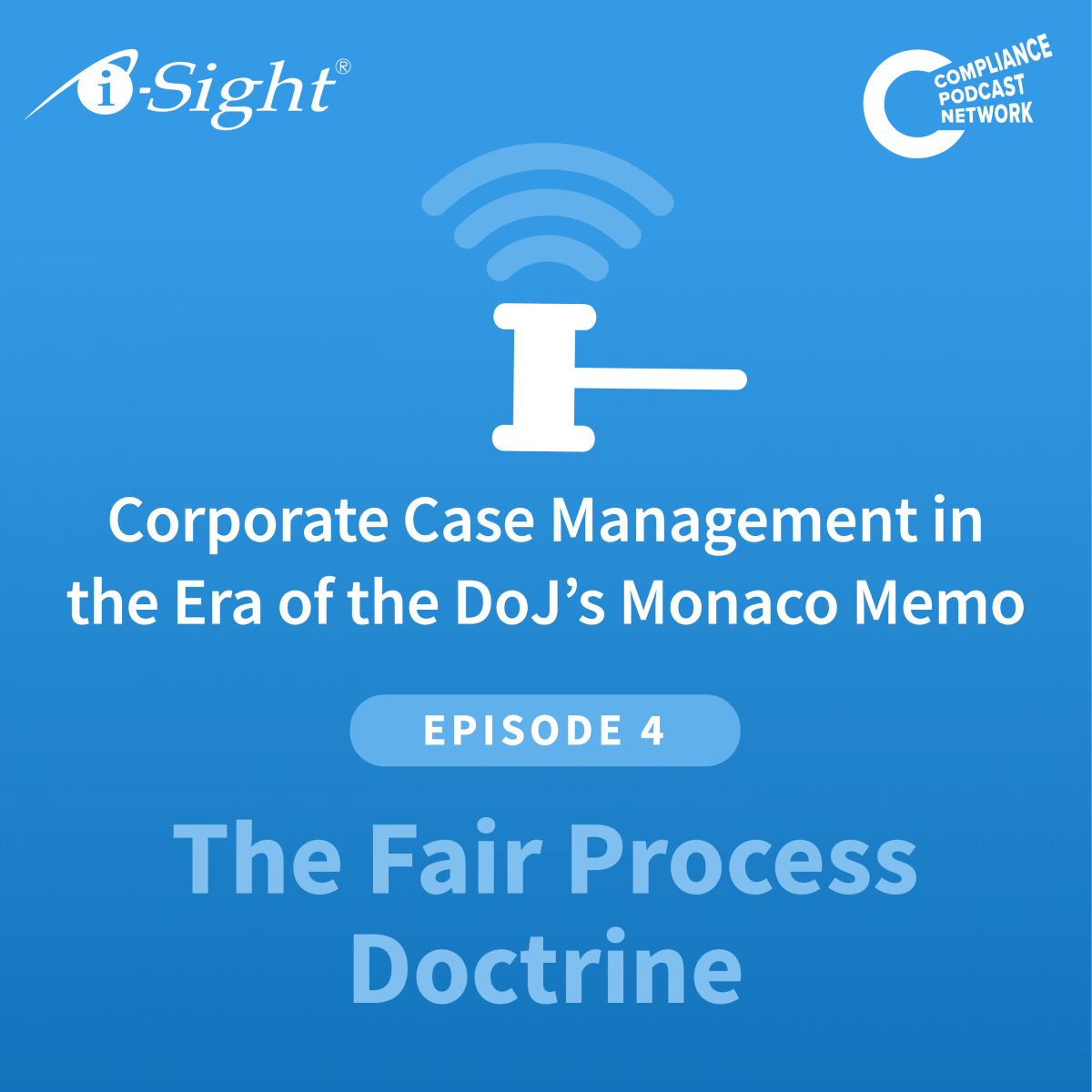Welcome to a special five-part blog series, entitled Corporate Case Management in the Era of the DoJ’s Monaco Memo, sponsored by i-Sight Software Solutions (i-Sight). Over this series, Jakub Ficner, Director of Partnership Development, and I consider how the Monaco Doctrine and Monaco Memo have impacted compliance in several key areas. We not only detail the changes wrought by the Monaco Memo but how compliance professionals can respond to these new challenges. In Part 4, we review the Fair Process Doctrine and consider it in light of the Department of Justice (DOJ) requirements around incentives and discipline as found in the Monaco Memo.
The Fair Process Doctrine says if your process is fair, people tend to accept an outcome they may not believe they want. One of the elements of the Fair Process Doctrine is to keep reporters aware of the status of your investigation. By having a fair process in any corporate internal investigation, it can be highly persuasive argument of why you should keep reporters informed so they will not become frustrated and look for outside avenues to report.
The need for speed in your investigative process is incredibly important, to keep the reporter invested in the process. If you can keep them invested in that process and that process is fair, reporters are more likely to accept a result that they may have not wanted or, or even disagreed with. Finally, from the perspective of the DOJ, justice and fairness are also wrapped up in this process so it is one more way a company can point to its overall corporate culture to show they are incorporating the concepts which the DOJ has articulated as important, which are justice and fairness. Ficner added that consistency, transparency and open processes are critical in your overall investigative process. Consistency is having a process in place, then going through the steps and consistently applying them in your outcomes or disciplinary actions.
Ficner noted, “When the process moves to the outcomes stage, I think that’s the key of implementing a true system, that the end-to-end life cycle of a complaint initiation all the way to closure is auditable and defensible. Outcomes is one of those where ultimately you have to be able to defend how you came to that outcome and what you did with that outcome. Every action that has been take in your investigative process is fully auditable within your case record. This allows you to maintain the integrity of the data within the case and be able to articulate the integrity of your process.”
If your result or outcome is termination, you want to be able to show how you came to that determination, based upon the evidence in the files. That can be a part of a cultural change of moving from a very siloed environment so that your overall process meets the requirements the DOJ has set forth. Ficner said, “if an auditor needs access to a specific case record, you can grant them access to that case record read only. You can even exclude specific sections or information that might be privileged or confidential if need be. That type of interaction by enabling them to have access to potentially the system itself increases internal trust amongst the various stakeholder groups.”
When it all comes down to your investigative process, at the bottom line it is about trust because it is the most critical aspect to have your employees trust you. This is about consistency in outcomes to maintaining internal trust. Equally critical, as laid out in the Monaco Memo, is that the DOJ will evaluate your culture so consistency can be a key element. Here Ficner noted that organizations often struggle to determine on this issue of consistently applying corrective actions or remedial actions across seemingly disparate cases based upon allegations and investigations. He said, “Oftentimes employees feel that top performers get a pass and ultimately that’s a detriment to the organization because employees will not report a top performer within the organization.” They may even feel like “What’s the point?”
If you can reinforce a consistent process, you can start taking that potential challenge away from the potential complainant from even submitting the complaint in the first place. This is where consistently in applying a process and an outcome can bring such big benefits. The data from the reports can also be used to validate if an organization is following through on that message. Your specific reports should have consistency around corrective actions. Through the data generated from a consistent approach, your organization can look at that data through multiple different parameters or lenses. Ficner said it could be “across case types, regions, departments, positions to see if you are consistently applying our remedial or corrective actions.”
By following the Fair Process Doctrine, your organization can derive multiple benefits, sometimes far beyond the employee who reports a perceived violation. You can enhance the stature of your overall compliance program and corporate culture. You can engender more trust in your company. Finally, if the government comes knocking and wants to review the consistency and transparency of your process; you will have an auditable investigative protocol. The same level of trust can bear out equal results if the DOJ assesses your overall corporate culture as well.
Join us tomorrow where conclude our series by looking at how data can drive not simply detection but also prevention.



